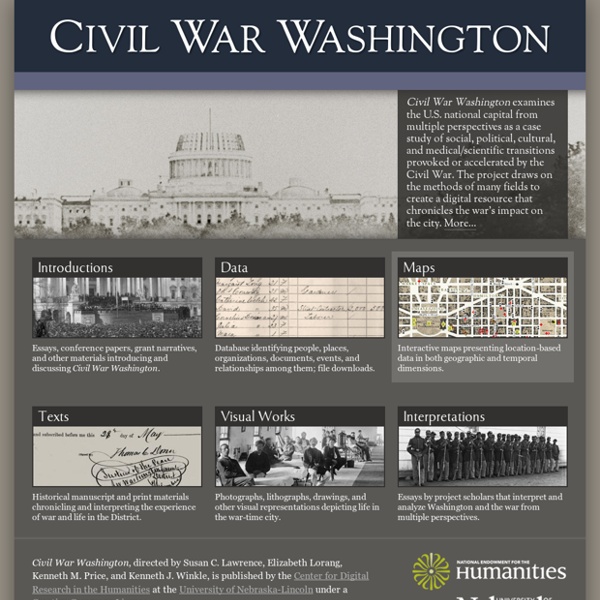



Civil War History | The Blog Between the States. Documents : Rice University The Papers of Jefferson Davis The following documents have been reproduced from the published volumes of The Papers of Jefferson Davis. They appear as they are printed, with spelling, grammar, punctuation, and abbreviations as written (editorial methodology appears in each volume). The extensive annotation that accompanies these documents is not included here. More material will be added over time. From Volume 1: Record of Delinquencies of the Corps of Cadets, June 5, 1828 --a listing of the demerits Davis received while a cadet at the U.S.Military Academy at West Point. From Volume 2: Speech recommending John C. From Volume 3: To Joseph E. From Volume 4: To John J. From Volume 5: Speech at Philadelphia, [July 12, 1853]--on the prospect of a transcontinental railroadTo William R. From Volume 6: From Volume 7: From Volume 8: To Joseph E. From Volume 9: From Volume 10: From Volume 11: From Volume 12: To Nelson A. From Volume 13:
American Presidents Blog Smithsonian Civil War Studies: Article - Friends and Collaborators Lost in History Friends and Collaborators Lost in History The Smithsonian Associates Civil War E-Mail Newsletter, Volume 4, Number 2 German society in the mid-1800's held little room for an intelligent and independent female social activist. These circumstances, and the prevalent anti-Semitism of the time, led journalist Ottilie Assing to move from her German homeland to the United States. Here she hoped to support herself as a correspondent, writing about life in America for the prestigious German newspaper Morgenblatt für gebildete Leser. Soon after she arrived in 1856, Assing arranged to interview Frederick Douglass and to tell about her writing and her desire to translate his autobiography into German. Shortly after learning she had cancer, Assing committed suicide and left Frederick Douglass as the sole heir in her will. The facts surrounding the discovery of Assing's letters to her sister are almost as amazing as what they describe.
Browse | Cornell University Library Making of America Collection Skip to main content Cornell University Cornell University Library Browse Making of America Browse Cornell University's MoA Journal Collection Search the MOA Journals ©2014 Cornell University Library | Contact Slaves and the Courts, 1740-1860 The Library of Congress Law Library of Congress,Rare Book and Special Collections Divisionand General Collections of the Library of Congress Slaves and the Courts, 1740-1860 contains just over a hundred pamphlets and books (published between 1772 and 1889) concerning the difficult and troubling experiences of African and African-American slaves in the American colonies and the United States. The mission of the Library of Congress is to make its resources available and useful to Congress and the American people and to sustain and preserve a universal collection of knowledge and creativity for future generations. The Library of Congress presents these documents as part of the record of the past. Special Presentation: Slave Code for the District of Columbia American Memory | Search All Collections | Collection Finder | Teachers
The History Carper » real history in the words of those who lived it Women of the American Civil War Era Kindle Title Carolina RainOpen the page of Carolina Rain and step on the streets of an era gone by. Carolina Rain is not just a read, but an experience. You will smell the magnolia trees, feel the sun on your face and taste the bittersweet tears of a beautiful young girl coming of age at the dawning of the Civil War. Petticoat Spies: Six Women Spies of the Civil War Describes the lives and wartime exploits of six women spies includes Sarah Emma Edmonds, Belle Boyd, Pauline Cushman, Rose O'Neal Greenhow, Elizabeth Van Lew, and Belle Edmondson. I'll Pass For Your Comrade: Women Soldiers in the Civil War Many people know about Clara Barton, the nurse who did so much to save soldiers' lives. The Woman in Battle: The Civil War Narrative of Loreta Janeta Velazquez, Cuban Woman and Confederate Soldier A Cuban woman fought in the Civil War for the Confederacy as the cross-dressing Harry T. Kindle Available The Robert E. Petersburg, Va. More Civil War "Colored" Pictures
The Civil War and Reconstruction Era, 1845-1877 Professor David W. Blight, Class of 1954 Professor of American History Description This course explores the causes, course, and consequences of the American Civil War, from the 1840s to 1877. Texts Bruce Levine, Half Slave and Half Free: The Roots of the Civil War. David Blight, Why the Civil War Came. Charles R. Drew G. E. Eric Foner, A Short History of Reconstruction, 1863-1877. Frederick Douglass, Narrative of the Life of Frederick Douglass, An American Slave, ed. by David W. Gary Gallagher, The Confederate War: How Popular Will, Nationalism, and Military Strategy Could Not Stave Off Defeat.Harvard University Press. James M. Louisa May Alcott, Hospital Sketches, ed. by Alice Fahs. Michael P. Nicholas Lemann, Redemption: The Last Battle of the Civil War. William Gienapp, ed., Civil War and Reconstruction: A Documentary Collection. We are using two anthologies of documents (Gienapp and Johnson). Films: Requirements There will be two required papers of 5-6 pages each. Grading